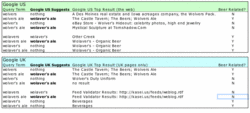Semantic Ambiguity Strikes Your Local Pub
Thursday night I was at Casablanca in Harvard Square for an information architecture meet and greet after Lou’s Enterprise IA seminar. I ordered a Wolver’s. It was dim and noisy, so after shouting three times and pointing, I ended up with a Wolaver’s…
Not a surprise, right? My first thought was “What’s in my glass?” My second thought – I was surrounded by information architects – was about the semantic angle on the situation. It seems like a fair mistake to make in a loud and crowded bar. But as someone who works there, he should know the environmental context, the ways it affects fundamental tasks like talking and answering questions, and about any alternatives to what he thought I said that are close enough to be easily mistaken. Before I get too far, I’ll point out that I liked the mistake enough to order another.
Setting aside for a moment the notion of a semantically adept agent system that monitors interactions between bartenders and patrons to prevent mistakes like this, let’s look at something more likely, such as how does Google fair with this situation? Some post-socialization research shows that as far as Google is concerned, all roads do in fact lead to Wolaver’s. Even when Google’s results list begins with a link to a page on Wolver’s Ale from the originating brewery, it still suggests that you might want ‘wolaver’s ale’. Maybe this explains the bartender’s mistake.
Here’s the breakdown: Google US suggests “wolaver’s ale” when you search for “wolvers ale” and “wolver’s ale”, but not the other way around. When you search for “Wolavers”, Google suggests the correctly punctuated “Wolaver’s”. You can get to the American ale, but not the British.
More surprising, it’s the same from Google UK, when searching only British pages. (Someone tell me how pages become part of the UK? Maybe when they’re sent off to full-time boarding school?)
Google’s insistence on taking me from wherever I start to “Wolaver’s Ale” comes from more than simple American brew chauvanism. This is what happens when the wrong factors drive decisions about the meanings of things; it’s these basic decisions about semantics that determine whether or not a thing correctly meet the needs of the people looking for answers to a question.
You might say semantic misalignment (or whatever we choose to call this condition) is fine, since Google’s business is aimed at doing something else, but I can’t imagine that business leaderhsip and staff at Wolver’s would be too happy to see Google directing traffic away from them by suggesting that people didn’t want to find them in the first place. Neither Wolver’s nor Wolavers seems to have Google ads running for their names, but what if they did? By now we’re all familar with the fact that googling ‘miserable failure‘ returns a link to the White House web site. This reflects a popularly defined association rich in cultural significance, but that isn’t going to satisfy a paying customer who is losing business because a semantically unaware system works against them.
This a good example of a situation in which intelligent disambiguation based on relationships and inferencing within a defined context has direct business ramifications.
Here’s a preview of the full size table that shows the results of checking some variants of wolvers / wolavers:
Related posts:
Category: Semantic Web | Tags: google, information_retrieval, semantics, semanticweb Comments Off Comment »